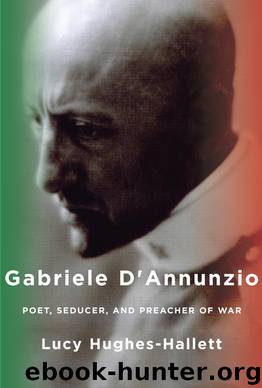Gabriele D'Annunzio by Lucy Hughes-Hallett

Author:Lucy Hughes-Hallett [Hughes-Hallett, Lucy]
Language: eng
Format: epub, mobi
ISBN: 978-0-385-34970-3
Publisher: Knopf Doubleday Publishing Group
Published: 2013-08-19T16:00:00+00:00
After the Germans drew back, d’Annunzio obtained a permit to drive out into the territory they had occupied in the weeks before. On a day of pouring rain he set out towards the front with three friends, one of whom recorded his “bizarre” get-up: a long yellow waterproof, goggles and a “kind of helmet of waxed cloth which covered his ears.” He was in high spirits. On this, and subsequent sallies into the war zone, he comported himself as though going on a jaunt. His companion found his gaiety and “verve” quite “extraordinary.”
A few days later he made another such excursion, this time taking Antongini with him. On each occasion he made copious and careful notes. They drove through devastated villages and abandoned fields. D’Annunzio concentrated on intimate details—grubby toys, a vase of artificial flowers and a “toothless” piano in an abandoned house; shutters flapping in the wind, blackened stooks of corn; the thinness of the cows and their distended, unmilked udders—sad remnants of blasted lives. He saw human corpses “as stiff as cardboard puppets,” but he paid more attention to the dead horses with which the roads and fields were littered, all lying stiff in the same ungainly pose, their bellies inflated by gas, their hind legs hoisted into the air, prey to carrion crows and clouds of flies. His notes are dispassionate, acutely observant, honest. Not so his published accounts of his explorations of the war zone.
On his second expedition he reached Soissons. Antongini reports that on the outskirts of the town a soldier examined d’Annunzio’s papers and told him “the city is being shelled. If you want to go on, you can, but you will probably be killed.” In the main square they found a horse and driver, both lying dead in their own blood. An officer ran out of a house, shouting at them to take cover or get out. This officer turned out to be a fervent admirer of d’Annunzio’s works, and—mollified—allowed him to stay for two hours and to distribute fifty packets of cigarettes to the soldiers. As d’Annunzio left he asked where the battle was, and was drolly pleased to be told that he was in the middle of it.
So much for Antongini’s laconic account of what happened. Here is d’Annunzio’s report, all puffed up with poetic sentiment and lies. Arriving at the brow of a hill, on a road crowded with cartloads of the wounded, he reached out his arms “with a gesture of love” towards the city. He could see the cathedral’s twin spires, which seemed to him to reach for the sky like imploring hands. The Germans were shelling the road. He was under fire, and so were all the helpless, mangled men around him. “Everything appeared beautiful to me.” Bloody bandages were like red and white rose bushes. He seemed to see an angel balancing between the cathedral’s two spires.
A sudden dazzling flash. A tremor of the air.
“There was a human and superhuman silence everywhere, in everything, as when
Download
This site does not store any files on its server. We only index and link to content provided by other sites. Please contact the content providers to delete copyright contents if any and email us, we'll remove relevant links or contents immediately.
| Afghan & Iraq Wars | American Civil War |
| American Revolution | Vietnam War |
| World War I | World War II |
Waking Up in Heaven: A True Story of Brokenness, Heaven, and Life Again by McVea Crystal & Tresniowski Alex(37020)
Empire of the Sikhs by Patwant Singh(22185)
We're Going to Need More Wine by Gabrielle Union(18088)
Hans Sturm: A Soldier's Odyssey on the Eastern Front by Gordon Williamson(16804)
Leonardo da Vinci by Walter Isaacson(11922)
The Radium Girls by Kate Moore(10921)
Educated by Tara Westover(7083)
Tools of Titans by Timothy Ferriss(6968)
How to Be a Bawse: A Guide to Conquering Life by Lilly Singh(6703)
The Last Black Unicorn by Tiffany Haddish(5083)
Permanent Record by Edward Snowden(5008)
The Rise and Fall of Senator Joe McCarthy by James Cross Giblin(4853)
Promise Me, Dad by Joe Biden(4459)
The Wind in My Hair by Masih Alinejad(4428)
The Crown by Robert Lacey(4116)
A Higher Loyalty: Truth, Lies, and Leadership by James Comey(4041)
The Iron Duke by The Iron Duke(3653)
Joan of Arc by Mary Gordon(3271)
How to be Champion: My Autobiography by Sarah Millican(3195)
